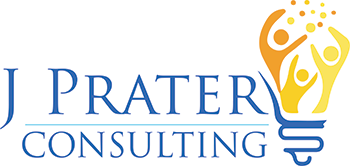Hello, my name is Jessica Prater and I am a chronic under-leader.
Now, I need to tell you a little bit about why this is such an important distinction and what it originally did for me. I came to the realization that this was a problem in 2013. I was in a class called Situational Leadership® where I was studying to become a facilitator. I had flown to Raleigh Durham North Carolina and was in the process of going through an intensive Boot Camp of learning how to teach this class.
Here’s a beautiful thing about being in training and facilitation – often times what you’re teaching is exactly what you need to hear.
I was at a place in my career where I was using a whole lot of pure influence. I had moved into a role where I had a Manager title, but all my power was peer influence. Chris McLean, a master facilitator for Situational Leadership®, brought up the concept of under leading versus over leading. I realized very quickly that I was struggling with under leading, not giving people enough information.
I was employed with a large multinational organization and had moved up the ranks fairly quickly. Still in my 20s, I was surrounded by people that were older than me that had more experience. Many times I found myself looking in the mirror and seeing a scared little girl. Even though I was several years into my career, I had not yet found my voice. I hadn’t tapped into my power and influence.
Now, I was certainly a high potential and highly engaged employee. I had a lot of things that I was doing well, but effectively influencing was not one of them. I struggled giving specific information because sometimes I felt like it was not my place to influence them, especially when they were older and had more experience than me. Even though I had some knowledge and at that point I had some real life experience, I was afraid anytime I tried to influence.
My biggest fear was that someone would ask “what gives you the right to tell me what to do”. In situations that were complex, where there was a difference of opinion or there was the potential for conflict, I defaulted to a posture of being vague or noncommittal. In some situations that served me as it avoided conflict and kept the peace.
However, I wasn’t authentic to myself. I wasn’t authentic to what I believed was most important in the situation. And at times it left my colleagues hanging because they didn’t understand what I was asking of them.
I have to confess that I live with very few regrets, but one that I do have is— I didn’t learn this important concept sooner.
In order to influence someone, you have to ask for what you need. I know it sounds really simple. Maybe you’re not like me, and you’ve already figured this out. You may struggle with other things with your leadership role.
Looking back, I may have been young and lacking experience, but I made some major missteps in my communication. I didn’t want to tell people what to do, which caused problems in several ways. The first was that I left people in a lurch because I was asking them to do something, but I didn’t truly tell them what I needed. That wasn’t fair to them because they were left wondering what is it that I was needing. Brené Brown says “clear is kind” and my avoidance was unkind. I left peers in a space where they were unsure of what I was expecting.
On a deeper level, if you were asking someone to do some thing they are then putting themselves out in a vulnerable place. If the one making the ask doesn’t give instructions for the direction they need set in, they’re more likely to struggle or fail. Do you want to be a person that sets others up to fail? I certainly don’t.
Lack of direction can cause massive bottlenecks and frustration. And we owe it to our teams to be clear and consistent with our influence.
I want my story to be one of personal growth and development. You may be struggling with changes in the workplace, your industry, how your team does work, or office/hybrid structures. Not just you – many of our employees are now struggling and its clear now’s the time we must commit to just being a little bit better in our communication.
Wouldn’t it be a positive impact if we all just commit to getting 10% better at clear communication. How much better would our world work a year from now?





